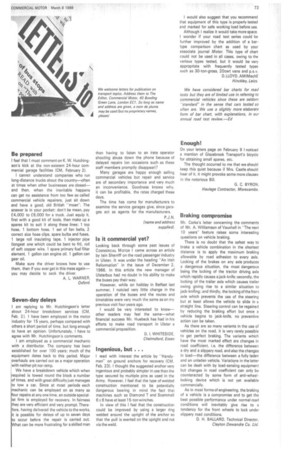Braking compromise Mr. Corke's letter concerning the comments of Mr.
Page 75

If you've noticed an error in this article please click here to report it so we can fix it.
A. Williamson of Vauxhall in -The next 10 years" feature raises some interesting questions on vehicle braking.
There is no doubt that the safest way to brake a vehicle combination in the shortest distance is to apply the maximum braking allowable by road adhesion to every axle. Locking of the brakes on any axle produces a dangerous situation, the most dangerous being the locking of the tractor driving axle which rapidly causes a jack-knife; secondly, the locking of the trailer ax1e which causes trailer swing giving rise to a similar situation to jack-knifing; and thirdly, the locking of the front axle which prevents the use of the steering but at least allows the vehicle to slide in a straight line. Steering control can be regained by reducing the braking effort but once a vehicle begins to jack-knife, no preventive action can be taken.
As there are so many variants in the use of vehicles on the road, it is very rarely possible to get perfect braking. The variants which have the most marked effect are changes in road coefficient i.e. the difference between a dry and a slippery road, and also the changes in load—the difference between a fully laden and an unladen vehicle. Variations in the latter can be dealt with by load-sensing equipment but changes in road coefficient can only be counteracted by some form of anti-wheellocking device which is not yet available commercially.
As in most forms of engineering, the braking of a vehicle is a compromise and to get the best possible performance under normal road conditions will inevitably give rise to a tendency for the front wheels to lock under slippery road conditions.
D. H. BALLARD, Technical Director, Clayton Dewandre Co. Ltd.




































































































































